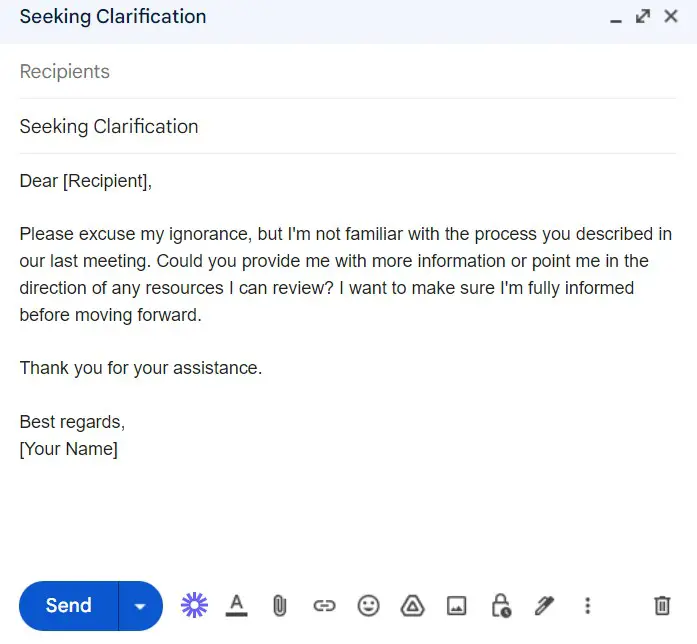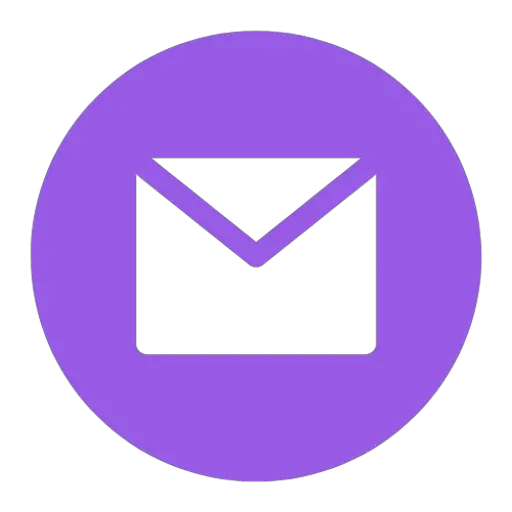In business communication, it’s essential to maintain professionalism and respect.
However, there are times when we may not have all the information or may not fully understand a topic.
In such situations, using the phrase “Please excuse my ignorance” can help show humility and a willingness to learn.
In this article, we will discuss the appropriate use of this phrase, provide examples of how to use it in different scenarios, and suggest alternative phrases to use in similar situations.
Contents
- How to Use “Please Excuse My Ignorance” in an Email
- “Please Excuse My Ignorance” Email Examples
- Example 1 – Subject: Seeking Clarification
- Example 2 – Subject: Project Update
- Example 3 – Subject: Asking for Feedback
- Example 4 – Subject: Requesting Assistance
- Example 5 – Subject: Seeking Advice
- Example 6 – Subject: Apologizing for Misunderstanding
- Example 7 – Subject: Acknowledging Mistakes
- Example 8 – Subject: Requesting a Meeting
- Example 9 – Subject: Clarifying Expectations
- Example 10 – Subject: Expressing Gratitude
- Alternative Ways to Say “Please Excuse My Ignorance” in an Email
How to Use “Please Excuse My Ignorance” in an Email
“Please excuse my ignorance” is a phrase that can be used to apologize for a lack of knowledge or understanding of a particular subject.
It’s appropriate to use this phrase when you’re seeking clarification or further information. You can use it in the following situations:
- When you’re new to a job or industry and are unfamiliar with specific terms or concepts
- When you’re unsure about the best way to approach a project or task
- When you need to ask a question or seek clarification on a topic
To make your email more effective, be specific about what you don’t understand and what information you need.
Check out the email examples below to see what we mean!
“Please Excuse My Ignorance” Email Examples
Here are ten examples of how to use the phrase “Please excuse my ignorance” in different scenarios:
Example 1 – Subject: Seeking Clarification
Dear [Recipient],
Please excuse my ignorance, but I’m not familiar with the process you described in our last meeting. Could you provide me with more information or point me in the direction of any resources I can review? I want to make sure I’m fully informed before moving forward.
Thank you for your assistance.
Best regards,
[Your Name]
Example 2 – Subject: Project Update
Dear [Recipient],
Please excuse my ignorance, but I’m not sure about the next steps for the XYZ project. Could you provide me with some guidance on the best way to approach this task?
Thank you for your time.
Best regards,
[Your Name]
Example 3 – Subject: Asking for Feedback
Dear [Recipient],
Please excuse my ignorance, but I’m not sure if I fully understand your feedback on my latest report. Could you elaborate on what you meant by [specific feedback point]?
Thank you for your help.
Best regards,
[Your Name]
Example 4 – Subject: Requesting Assistance
Dear [Recipient],
Please excuse my ignorance, but I’m having trouble with [specific task]. Could you provide me with some assistance or point me in the direction of any resources that could help?
Thank you for your support.
Best regards,
[Your Name]
Example 5 – Subject: Seeking Advice
Dear [Recipient],
Please excuse my ignorance, but I’m not sure how to approach [specific situation]. Could you provide me with some advice on the best course of action?
Thank you for your time.
Best regards,
[Your Name]
Example 6 – Subject: Apologizing for Misunderstanding
Dear [Recipient],
Please excuse my ignorance, but I misunderstood your instructions for [specific task]. I apologize for any confusion this may have caused. Could you please clarify what you meant?
Thank you for your understanding.
Best regards,
[Your Name]
Example 7 – Subject: Acknowledging Mistakes
Dear [Recipient],
Please excuse my ignorance, but I realize now that I made a mistake on [specific task]. I’m sorry for any inconvenience this may have caused. Could you provide me with guidance on how to correct it?
Thank you for your patience.
Best regards,
[Your Name]
Example 8 – Subject: Requesting a Meeting
Dear [Recipient],
Please excuse my ignorance, but I’m not sure about the specifics of the upcoming meeting. Could you provide me with more information on the agenda and any materials I should review beforehand?
Thank you for your time.
Best regards,
[Your Name]
Example 9 – Subject: Clarifying Expectations
Dear [Recipient],
Please excuse my ignorance, but I’m not sure about the expectations for this project. Could you provide me with more information on what you’re looking for and how you want it to be completed?
Thank you for your help.
Best regards,
[Your Name]
Example 10 – Subject: Expressing Gratitude
Dear [Recipient],
Please excuse my ignorance, but I was not aware of the impact of your work on the project’s success. Thank you for your contributions, and I appreciate your dedication to the team.
Best regards,
[Your Name]
Alternative Ways to Say “Please Excuse My Ignorance” in an Email
While “Please excuse my ignorance” is a common phrase used in professional emails, there are alternative ways to convey the same meaning.
Here are some examples:
- I would appreciate any guidance you can provide
- Could you help me better understand?
- I’m seeking clarification on…
- Could you enlighten me on this topic?
- I’m not entirely sure I understand, could you please explain further?
Using the phrase “Please excuse my ignorance” in your emails can help show humility and a willingness to learn.
Remember to be specific about what you don’t understand and what information you need.
If you want to vary your language, try using alternative phrases with similar meanings. With these tips, you can improve your email communication and maintain strong professional relationships.


